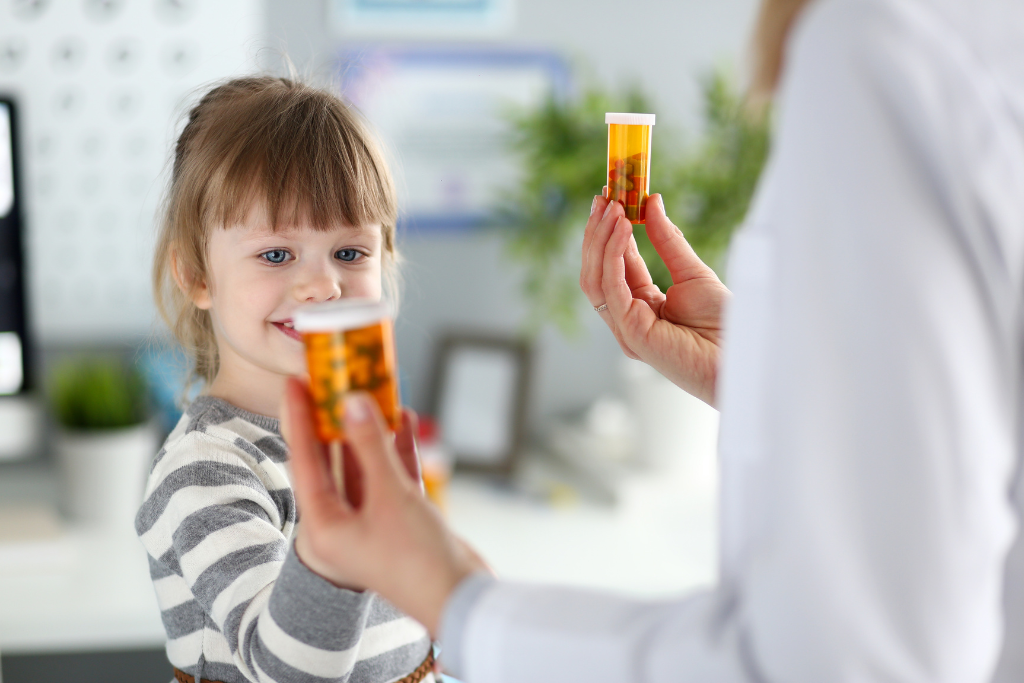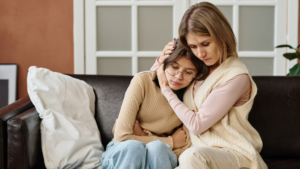When your child is struggling nothing is more important than finding the solutions to ease their worries. But when it comes to mental health care for children and teens, effective solutions seem few and far between.
When a child's attention, behavior or emotions are dysregulated, the focus should be on calming the brain. Without a calm brain, learning not only is hard but nothing sticks. It means that there will be a constant loop of frustration for both parent and child. It's also exactly how relationships break down and hope runs out.
Parents often aren't aware of other ways to reduce symptoms related to ADHD, depression, and anxiety or mood disorders. As a result, they turn to medication and talk therapy with little improvement. It's also why they dive into a Google search in the middle of the night.
Are SSRIs FDA Approved for Children?
As a parent, you obviously want the best for your child struggling with anxiety. However with a simple Google search, you will be quick to learn of the danger and severe side effects of many antidepressants when used in children.
Despite their common use in many adolescents, antidepressants and SSRIs (Selective Serotonin Reuptake Inhibitors) carry a food and drug administration (FDA) administered black box warning, making consumer's under 25 aware of their possible dangers (Mayo Clinic, 2022).
Drugs such as fluoxetine, an SSRI also known as Prozac, is an antidepressant approved by the FDA for the treatment of depression in both children and adolescents ages 8 years and older. However it comes with a multitude of risks and considerations. Even though your child may be eligible to take these SSRIs, it is important to consider the risk factors and side effects before committing to them.
Are SSRIs Safe For Children?
In December 2003, the UK Medicines and Healthcare Products Regulatory Agency (MHRA) decided that the risks to pediatric patients outweigh the benefits of treatment with SSRIs other than fluoxetine in children 18 and under.
Antidepressants used to treat depression and anxiety are sometimes found to trigger worsened anxiety, agitation, hostility, restlessness or impulsive behavior, and are strongly linked to suicidal thoughts and behaviors (Mayo Clinic, 2022).
They are deemed a safe treatment for anxiety and depression by the FDA, though side effects can range from headaches, nausea, vomiting, abdominal pain, and insomnia, to anything such as seizures and tremors (2013).
What are side effects of anxiety and depression medication on children and teens?
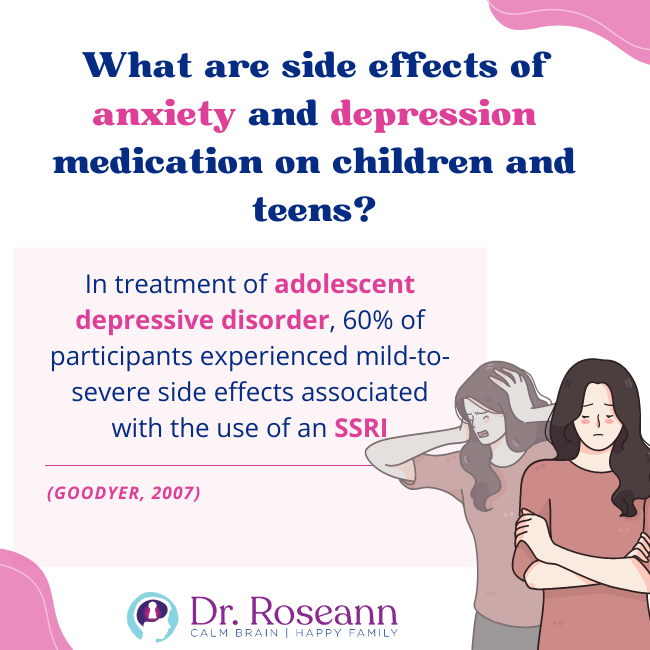
In treatment of adolescent depressive disorder, 60% of participants experienced mild-to-severe side effects associated with the use of an SSRI (Goodyer, 2007). SSRI is a medication widely used on depressed children, teens, and adults.
Many psychical symptoms can arise, ranging from minor disturbances to major complications. In children, side effects are often short-term, however are commonly off putting to many parents looking to medicate their child.
Sleep, stomach, and appetite problems usually arise from taking drugs such as Prozac, though additional mental health disorders can arise as well (Janssen, 2021). It is therefore important to weigh the benefits and risks of using these antidepressant medications on kids. Many children and teens reports to experience trouble sleeping, feeling irritable, and acting pushy, angry, or violent when on these medications.
Psychiatric side effects of SSRIs can be categorized in smaller groups; mania, including both mania and hypomania, depression (aggravation of depression, crying, irritability, anger, hypersensitivity), and forms of agitation such as akathisia, restlessness, nervousness, and hyperactivity.
Other comorbidities can also arise when taking antidepressants, including new or worsened anxiety and depression and other related disorders. The FDA also warms patients of the increased risk of suicide attempts, making the choice to put a child on antidepressants one that requires a great deal of research and thought.
#1 Side Effect: Suicidal Thoughts
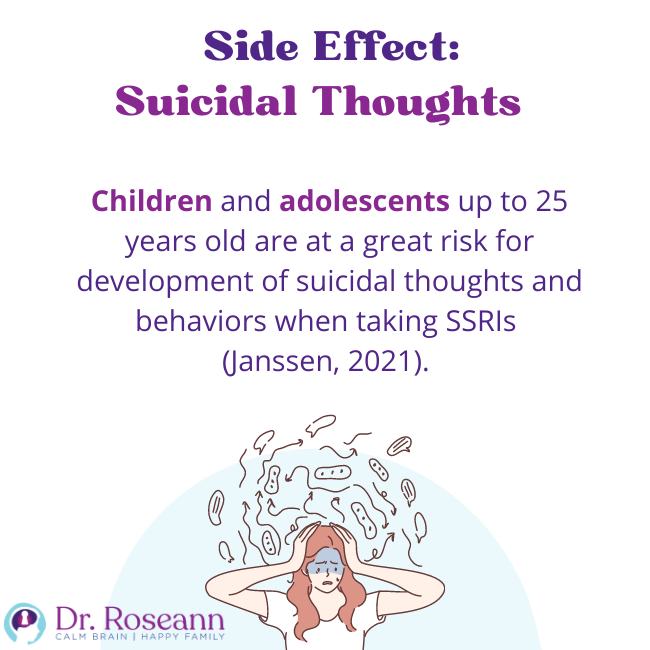
Children and adolescents up to 25 years old are at a great risk for development of suicidal thoughts and behaviors when taking SSRIs (Janssen, 2021). Thinking about suicide is as alarming as a child or teen acting on dangerous impulses. No one should wait until a person attempts suicide before addressing the problem.
Children taking antidepressants therefore need increased supervision and care, as their mood may decline far below their original state, and find themselves having panic attacks, extreme sadness, and may have increased suicidal thoughts or other harmful actions. When you see your child extremely depressed or very agitated or restless, that's a red flag that needs immediate attention.
I recently worked with a middle school aged boy whose holistic parents felt “forced” to put their depressed son on psychiatric medication. When their son expressed suicidal thoughts they went to the hospital and the parents reported that unless they agreed to medication, they would have to put their son in a psychiatric facility. They didn't feel like they had a choice, so they then proceeded to spend the next six months changing medication to medication. Garrett had many side effects including tics, chronic fatigue, dissociative periods, thyroid issues, reduced appetite, and inreased suicidal feelings. By the time they came to me, he was physically not himself, albeit not suicidal, and it took some time in our BrainBehaviorReset™ program to get Garrett and his family back on track.
#2 Side Effect: New or Increased Depression
Prozac has the most robust evidence supporting its use as a treatment for Major Depressive Disorder in kids aged 8 to 18, however while testing the drug's efficacy, many side effects were revealed. Physical and emotional side effects were observed, including increased irritability, sadness, and self-harm (Garland, 2016). Emotional lability and bipolar disorder episodes, including emergent mania, were also observed in patients taking Prozac for their MDD.
#3 Side Effect: New or Increased Anxiety
Though they are thought to improve mood in patients dealing with depression and anxiety, SSRIs are not always smooth sailing. Fluoxetine (prozac) boosts serotonin levels in the brain, though the exact stress pathway it acts on is not always impacted in the same way. Because of this, SSRIs can actually induce fear and anxiety in some individuals.
Instead, working to resolve anxious thoughts and tendencies through therapy can remove these negative thoughts instead of pushing them away with medicine. Supplements can also restore balance throughout the mind and body holistically, adding helpful resources into your body instead of worsening your brain's imbalance.
Common Questions about SSRI Medications
Aside from SSRI medications, parents should know that there are other options that get to the root cause of mental disorders, and teach children skills to properly cope with their illness. Parents should always observe their children when on these medications, such as extreme increase in movement and talking or any changes in behavior or mood.
If you observe any of these on your kids, then you must seek other alternatives to treatment. Here are some of the questions parents may ask about these medications.
Does my Child Have to Take Medication for Anxiety or Depression?
There is no single answer to this question, as each case is unique. Pediatric anxiety, major depressive disorder, and obsessive-compulsive disorder are treated with antidepressants, particularly SSRIs. While SSRIs are also the first line of treatment for PTSD, their efficacy hasn't been demonstrated in children and adolescents (Dwyer & Bloch, 2019).
It's important for mental health practitioners and family members to be educated about the possible adverse effects of these medications. They should also anticipate the difficulties encountered by their children, monitor their behavior, and provide informed consent. The black box risk of suicide warning should also be highly regarded.
Is medication usage on the rise as cases of anxiety, depression, OCD and rates of suicidal ideation rise to an all time high?
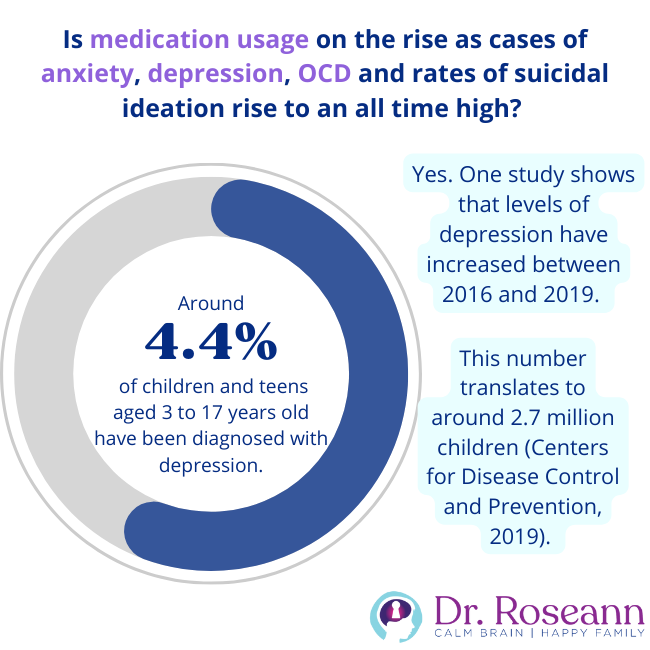
Yes. One study shows that levels of depression have increased between 2016 and 2019. Around 4.4% of children and teens aged 3 to 17 years old have been diagnosed with depression. This number translates to around 2.7 million children (Centers for Disease Control and Prevention, 2019).
Should medication always be the first line of defense in treating anxiety and depression in children?
No. Children and teens with clinical anxiety may benefit from many years of psychopharmacological research yielding safer medications and more tolerable side effects, but these drugs may not promise improved efficacy. While SSRIs used as first-line antidepressants may do a reasonable job of reducing anxiety, they also act slowly and often fail to lead to sustained remission (Farach et al., 2012).
What other treatment options are available for children with anxiety or depression?
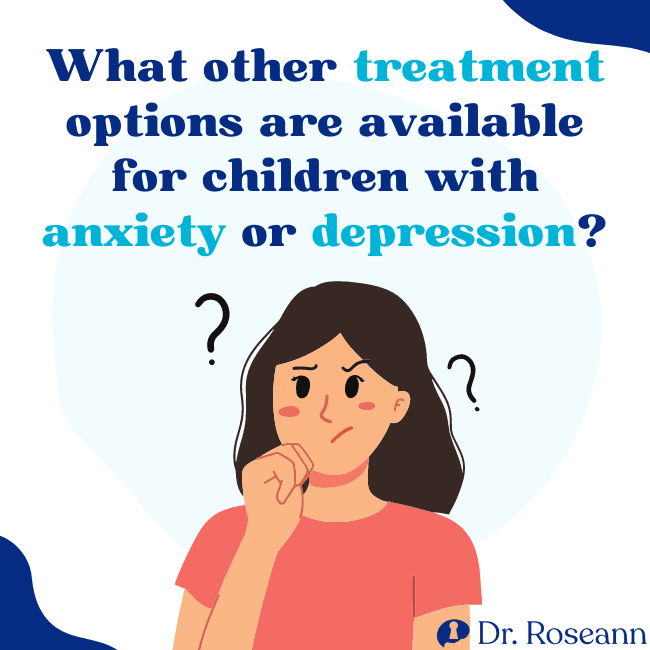
Many other treatment options exist to help relieve distress and symptoms resulting from anxiety and depression. Cognitive Behavioral Therapy (CBT) helps patients learn new thought processes and better habits to build up self-esteem and a healthy way about thinking of themselves and others (2017).
This is a common, yet effective therapy for children struggling with anxiety or depression, and can be extremely helpful in the long run, and includes none of the dangerous risks that come with medication.
Somatic Therapy helps kids create a mind-body connection, allowing them to become aware of their bodily sensations to release stress and anxiety. Calming the peripheral nervous system, as opposed to just the brain, can help rid people of chronic stress and cope with trauma without the painful conversations brought on by talking therapy.
Exposure Therapy teaches children how to confront their fears or obsessions, actually resolving the problems instead of using medicine to simply suppress them. Exposure and Response Prevention (ERP) combines methods of exposure therapy and combines them with CBT, leading to desensitization to fears and triggers, and conditioned behavior leading to more positive habits when dealing with anxiety.
Emotional Freedom Tapping Therapy (EFT) works to remove unresolved negative thoughts that are getting in the way of a happy, non-anxious lifestyle. With the help of a psychologist, patients can learn to tap certain points on their head that correlate with specific energy channels, all while identifying faulty thought patterns, releasing them from your body and mind.
Neurofeedback can help calm your child's mind, relieving stress and anxieties and improving their mood and depression. With a specifically designed protocol just for your child, neurofeedback can target precise brain regions, helping relieve many combinations of symptoms safely and efficiently. Dr. Roseann and the whole team here will work to provide you and your child with a perfect plan for success, backed by the most current research in neuroscience and psychology.
Citations
American Psychological Association. (2017, July). What Is cognitive behavioral therapy? American Psychological Association. https://www.apa.org/ptsd-guideline/patients-and-families/cognitive-behavioral
Amitai, M., Chen, A., Weizman, A., & Apter, A. (2015). SSRI-Induced Activation Syndrome in Children and Adolescents—What Is Next? Current Treatment Options in Psychiatry, 2(1), 28–37. https://doi.org/10.1007/s40501-015-0034-9
Brazier, Y. (2016, August 28). Understanding the unhappy side of serotonin. Medical News Today. https://www.medicalnewstoday.com/articles/312537
Centers for Disease Control and Prevention. (2019, May 1). Anxiety and depression in children: Get the facts. Centers for Disease Control and Prevention. https://www.cdc.gov/childrensmentalhealth/features/anxiety-depression-children.html
DiMaria, L. (2011, June 27). Potential Prozac Side Effects in Children. Verywell Mind; Verywell Mind. https://www.verywellmind.com/possible-prozac-side-effects-in-children-1067011
Dwyer, J. B., & Bloch, M. H. (2019). Antidepressants for Pediatric Patients. Current Psychiatry, 18(9), 26–42F. https://www.ncbi.nlm.nih.gov/pmc/articles/PMC6738970/
Farach, F. J., Pruitt, L. D., Jun, J. J., Jerud, A. B., Zoellner, L. A., & Roy-Byrne, P. P. (2012). Pharmacological treatment of anxiety disorders: Current treatments and future directions. Journal of Anxiety Disorders, 26(8), 833–843. https://doi.org/10.1016/j.janxdis.2012.07.009
Goodyer, I., Dubicka, B., Wilkinson, P., Kelvin, R., Roberts, C., Byford, S., Breen, S., Ford, C., Barrett, B., Leech, A., Rothwell, J., White, L., & Harrington, R. (2007). Selective serotonin reuptake inhibitors (SSRIs) and routine specialist care with and without cognitive behaviour therapy in adolescents with major depression: randomised controlled trial. BMJ, 335(7611), 142. https://doi.org/10.1136/bmj.39224.494340.55
Gordon, M., & Melvin, G. (2013, October). Selective serotonin re-uptake inhibitors. Australian Family Physician. https://www.racgp.org.au/afp/2013/september/ssris-and-adolescents
Halverson, J. L., Bhalla, R. N., Moraille-Bhalla, P., Andrew, L. B., & Leonard, R. C. (2022). Depression Treatment & Management: Approach Considerations, Pharmacologic Therapy for Depression, Psychotherapy. EMedicine. https://emedicine.medscape.com/article/286759-treatment#d14
Mayo Clinic. (2016). Antidepressants for children and teens (S. Pruthi, Ed.). Mayo Clinic. https://www.mayoclinic.org/diseases-conditions/teen-depression/in-depth/antidepressants/art-20047502
Osterweil, N. (2004). Kids and Antidepressants: A Growing Problem. WebMD. https://www.webmd.com/depression/features/kids-antidepressants-growing-problem
Always remember… “Calm Brain, Happy Family™”
Are you looking for SOLUTIONS for your struggling child or teen?
Dr. Roseann and her team are all about solutions, so you are in the right place!
There are 3 ways to work with Dr. Roseann:
You can get her books for parents and professionals, including: It’s Gonna Be OK™: Proven Ways to Improve Your Child’s Mental Health, Teletherapy Toolkit™ and Brain Under Attack: A Resource For Parents and Caregivers of Children With PANS, PANDAS, and Autoimmune Encephalopathy.
If you are a business or organization that needs proactive guidance to support employee mental health or an organization looking for a brand representative, check out Dr. Roseann’s media page and professional speaking page to see how we can work together.
Dr. Roseann is a Children’s Mental Health Expert and Therapist who has been featured in/on hundreds of media outlets including, CBS, NBC, FOX News, PIX11 NYC, The New York Times, The Washington Post,, Business Insider, USA Today, CNET, Marth Stewart, and PARENTS. FORBES called her, “A thought leader in children’s mental health.”

She is the founder and director of The Global Institute of Children’s Mental Health and Dr. Roseann Capanna-Hodge. Dr. Roseann is a Board Certified Neurofeedback (BCN) Practitioner, a Board Member of the Northeast Region Biofeedback Society (NRBS), Certified Integrative Medicine Mental Health Provider (CMHIMP) and an Amen Clinic Certified Brain Health Coach. She is also a member of The International Lyme Disease and Associated Disease Society (ILADS), The American Psychological Association (APA), Anxiety and Depression Association of America (ADAA) National Association of School Psychologists (NASP), International OCD Foundation (IOCDF) International Society for Neurofeedback and Research (ISNR) and The Association of Applied Psychophysiology and Biofeedback (AAPB).
© Roseann-Capanna-Hodge, LLC 2023
Disclaimer: This article is not intended to give health advice and it is recommended to consult with a physician before beginning any new wellness regime. *The effectiveness of diagnosis and treatment vary by patient and condition. Dr. Roseann Capanna-Hodge, LLC does not guarantee certain results.

